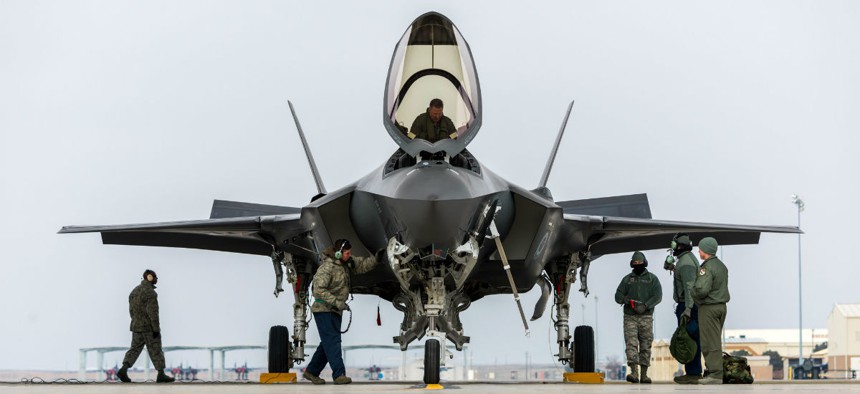
An F-35A team parks the aircraft for the first time at Mountain Home Air Force Base, Idaho, Feb. 8, 2016. U.S. Air Force photo by Airman 1st Class Connor J. Marth
Defense Contractors Should Fear More Than Trump’s Tweets
It’s not just Lockheed and Boeing. As president, Trump can mess with just about any contract he wants, even high-priced fighter jets, ships and armored trucks.
It would be nearly impossible for President-Elect Donald Trump to kill the F-35 Joint Strike Fighter—or any other expensive Pentagon weapon that he inherits upon taking the oath of office on Jan. 20—but he could shake down defense contractors for billions of dollars.
Trump has brought the rather mundane contract negotiation process out from the privacy of corporate board rooms and into the public spotlight with his recent tweets about the exorbitant estimated price tag for a new Air Force One and the “out of control” cost of the F-35—the Pentagon’s $400 billion stealth jet that has as well-documented history of being late and over budget.
“[I]t is very important to remember that the President has tremendous power to do/get what he wants,” Roman Schweizer, an analyst with Cowen and Company wrote in a note to investors on Monday. “Of course, Congress has an important role in defense programs and we expect lawmakers to weigh in on F-35 and others. But which lawmaker is going to criticize Trump for trying to get better terms on ‘overpriced’ defense programs?”
Axing a project like the F-35 would be tough to force through Congress.The jet has created 146,000 jobs in 45 states and Puerto Rico. That leaves Trump with another option: Paying only what he feels companies deserve for the their work. In other words, he could force companies to accept a contract or walk.
Think that’s a radical move? President Obama’s Pentagon did just that last month, giving Lockheed a $6.1 billion take-it-or-leave-it deal to for 57 F-35s. Lockheed has until February to accept or appeal the offer.
It’s unusual for a president to take a deep dive into nuances of the Pentagon’s arms deals, but Trump’s recent tweets have already had an impact on defense firms’ bottom lines. Lockheed shares fell Monday more than 5 percent before rallying, closing down 2.47 percent. Lockheed’s F-35 suppliers also took a hit on Wall Street. Shares of Northrop Grumman—which makes the jet’s center fuselage, radar and other high-tech sensors—fell nearly 6.8 percent from Friday’s close. It closed down 2.67 percent on Monday.
“Until the costs and risks of conceivable alternatives are known, compared to current F-35 plans, we don’t believe investors should panic over the program’s prospects based on a single Trump tweet,” said Byron Callan, an analyst with Capital Alpha Partners, in an email to investors.
But there might be reason for concern.
“It’s too early to determine or quantify an impact but we cannot dismiss the president-elect’s demonstrated interest in high profile defense programs and his penchant for distilling his terse criticisms into 140 characters,” Schweizer wrote.
The Pentagon plans to sign a lot of new, pricey contracts during Trump’s presidency. New pilot training jets, intelligence planes, and helicopters are all expected in the next year or so. The Navy is planning to buy new nuclear submarines and the Marine Corps wants a new amphibious assault vehicle. There’s also new intercontinental ballistic missiles and nuclear cruise missiles.
Then there are the projects already on the books, like the F-35. Every year, the Pentagon signs individual deals for each batch of warplanes, ships and armored vehicles. Each deal is typically negotiated on a yearly basis.
“[W]e do not think he is going to tolerate front-page headlines during his term about massive program overruns, poor performance, or broken ships and aircraft,” Schweizer wrote. “And perception may matter more than details.”
The Pentagon is already negotiating its next batch of about 100 F-35s, a deal that could be worth upwards of $7 billion. If a deal is not reached before Jan. 20, it could become the first real test of President Trump’s skills as negotiator in chief.







